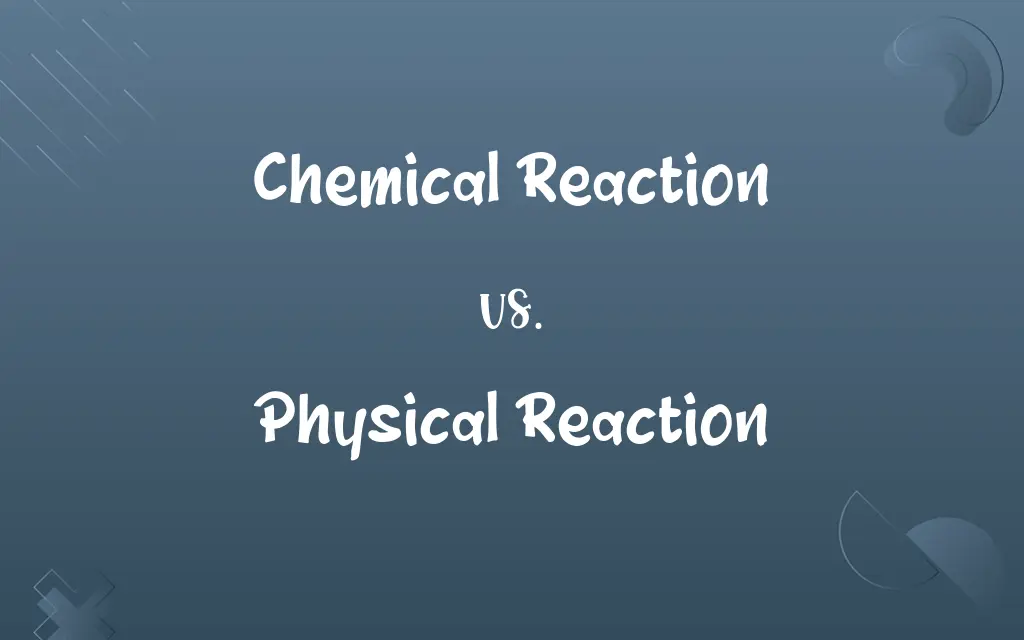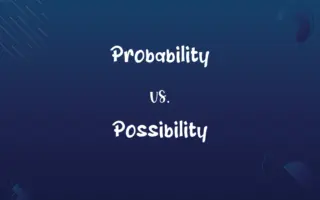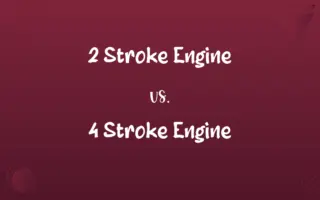Chemical Reaction vs. Physical Reaction: Know the Difference

By Shumaila Saeed || Updated on December 25, 2023
A Chemical Reaction involves new substances forming, while a Physical Reaction involves a change in form, not composition.

Key Differences
Chemical Reactions result in the formation of new chemical substances, involving changes at the molecular level. Physical Reactions, on the other hand, are changes that do not alter the chemical nature of substances; they only change the physical appearance or state.
Shumaila Saeed
Dec 20, 2023
In Chemical Reactions, bonds between atoms are broken and new ones are formed, signifying a chemical change. Conversely, Physical Reactions involve changes like phase transition or shape alteration, without any alteration in molecular composition.
Shumaila Saeed
Dec 20, 2023
Energy changes in Chemical Reactions often involve release or absorption of heat or light, indicative of a chemical process. Physical Reactions, however, typically involve more subtle energy changes, primarily related to physical state changes like melting or boiling.
Shumaila Saeed
Dec 20, 2023
A hallmark of Chemical Reactions is the irreversibility of the change in many cases, as new substances are formed. In contrast, most Physical Reactions are reversible, like water freezing and melting, without any new substances being created.
Shumaila Saeed
Dec 20, 2023
Chemical Reactions can be identified by signs like color change, gas formation, or precipitate formation. Physical Reactions, in contrast, don’t exhibit such signs but might involve changes like size, shape, or phase without altering the substance’s identity.
Shumaila Saeed
Dec 20, 2023
ADVERTISEMENT
Comparison Chart
Nature of Change
Alters molecular composition
Does not alter molecular composition
Shumaila Saeed
Dec 20, 2023
Energy Involvement
Involves energy changes like heat/light
Involves less dramatic energy changes
Shumaila Saeed
Dec 20, 2023
Observable Signs
Indicators like color change, gas release
Changes in size, shape, or state
Shumaila Saeed
Dec 20, 2023
ADVERTISEMENT
Chemical Reaction and Physical Reaction Definitions
Chemical Reaction
A process where reactants yield products with different properties.
The reaction between hydrogen and oxygen to form water is a classic chemical reaction.
Shumaila Saeed
Dec 04, 2023
Physical Reaction
A reaction involving a change in physical properties without a chemical change.
Crushing a can changes its shape, a physical reaction without altering the metal's chemical structure.
Shumaila Saeed
Dec 04, 2023
Chemical Reaction
A change resulting in the formation of new chemical substances.
Rust forming on iron is a chemical reaction involving iron and oxygen.
Shumaila Saeed
Dec 04, 2023
Physical Reaction
A reaction where the substance undergoes a physical change.
Shredding paper is a physical reaction; the paper's composition remains the same.
Shumaila Saeed
Dec 04, 2023
Chemical Reaction
A transformation leading to the rearrangement of atoms.
Burning wood in a fireplace is a chemical reaction that releases heat and light.
Shumaila Saeed
Dec 04, 2023
ADVERTISEMENT
Physical Reaction
A reversible change in the appearance or phase of a material.
Dissolving salt in water is a physical reaction since it can be reversed by evaporation.
Shumaila Saeed
Dec 04, 2023
Chemical Reaction
A process where substances interact to form new compounds.
Combining vinegar and baking soda creates a chemical reaction that produces carbon dioxide.
Shumaila Saeed
Dec 04, 2023
Physical Reaction
A process that involves changes in state like solid to liquid or liquid to gas.
Freezing water to make ice cubes is a physical reaction.
Shumaila Saeed
Dec 04, 2023
Chemical Reaction
A reaction involving the breaking and forming of chemical bonds.
Photosynthesis in plants is a chemical reaction that converts carbon dioxide and water into glucose.
Shumaila Saeed
Dec 04, 2023
Physical Reaction
A change that alters the form or state of a substance but not its chemical composition.
Boiling water is a physical reaction where liquid turns into vapor.
Shumaila Saeed
Dec 04, 2023
Repeatedly Asked Queries
What is an example of a physical reaction?
An example is the melting of ice into water, a reversible physical change.
Shumaila Saeed
Dec 20, 2023
Do chemical reactions always release energy?
Not always. Chemical reactions can either release (exothermic) or absorb (endothermic) energy.
Shumaila Saeed
Dec 20, 2023
Are all chemical reactions easily reversible?
No, many chemical reactions are irreversible, resulting in permanent changes.
Shumaila Saeed
Dec 20, 2023
What defines a chemical reaction?
A chemical reaction involves the transformation of substances into new products with different chemical properties.
Shumaila Saeed
Dec 20, 2023
What are signs of a chemical reaction?
Signs include color change, gas formation, temperature change, or precipitate formation.
Shumaila Saeed
Dec 20, 2023
Is freezing a chemical or physical reaction?
Freezing is a physical reaction as it involves a state change without altering chemical composition.
Shumaila Saeed
Dec 20, 2023
Can a physical reaction change the chemical structure of a substance?
No, a physical reaction changes the form or state of a substance without altering its chemical structure.
Shumaila Saeed
Dec 20, 2023
What happens to atoms during a chemical reaction?
In a chemical reaction, atoms are rearranged to form new substances.
Shumaila Saeed
Dec 20, 2023
Can a physical reaction alter the molecular structure?
No, physical reactions do not alter the molecular structure of substances.
Shumaila Saeed
Dec 20, 2023
Is tearing paper a chemical reaction?
No, tearing paper is a physical reaction as it changes the shape but not the chemical composition of the paper.
Shumaila Saeed
Dec 20, 2023
Are all physical reactions reversible?
Many, but not all, physical reactions are reversible.
Shumaila Saeed
Dec 20, 2023
Can a chemical reaction be physically observed?
Yes, physical signs like color change or gas production can indicate a chemical reaction.
Shumaila Saeed
Dec 20, 2023
Is boiling an example of a chemical reaction?
No, boiling is a physical reaction involving a change from liquid to gas.
Shumaila Saeed
Dec 20, 2023
Can a physical reaction occur without energy change?
Most physical reactions involve some energy change, often less intense than in chemical reactions.
Shumaila Saeed
Dec 20, 2023
Is dissolving sugar in water a chemical reaction?
No, it's a physical reaction as it doesn't produce new substances.
Shumaila Saeed
Dec 20, 2023
Does a chemical reaction always result in a color change?
Not always, but color change can be an indicator of a chemical reaction.
Shumaila Saeed
Dec 20, 2023
How is energy involved in a chemical reaction?
Energy is either absorbed or released during the breaking and forming of chemical bonds in a chemical reaction.
Shumaila Saeed
Dec 20, 2023
What is an example of an irreversible chemical reaction?
Burning paper is irreversible as it results in new substances like ash and gases.
Shumaila Saeed
Dec 20, 2023
Is stretching rubber a chemical reaction?
No, stretching rubber is a physical reaction as it changes shape but not its chemical composition.
Shumaila Saeed
Dec 20, 2023
Do physical reactions form new substances?
No, physical reactions only change the physical form or state of a substance.
Shumaila Saeed
Dec 20, 2023
Share this page
Link for your blog / website
HTML
Link to share via messenger
About Author
Written by
Shumaila SaeedShumaila Saeed, an expert content creator with 6 years of experience, specializes in distilling complex topics into easily digestible comparisons, shining a light on the nuances that both inform and educate readers with clarity and accuracy.








































































